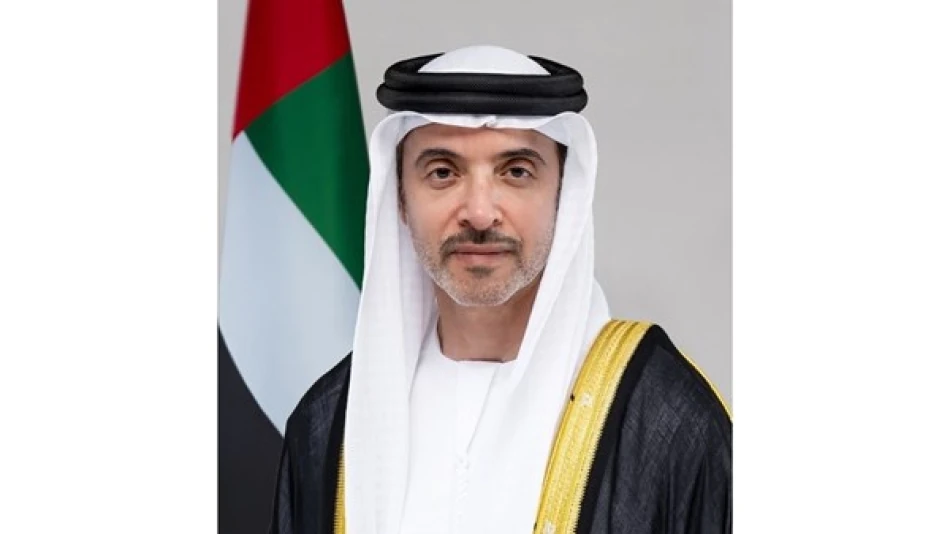
Emirati Women: Crucial Pillars in UAE's Development and Active Partners in its Renaissance
UAE Launches Ambitious 50-Year Women's Empowerment Initiative as Regional Gender Equality Champion
The United Arab Emirates has unveiled the "Mother of the Emirates 50:50" initiative, a comprehensive five-decade program aimed at strengthening women's participation across all sectors of society. The announcement, made during UAE Women's Day celebrations, positions the Emirates as a global benchmark for gender empowerment while setting ambitious targets that could reshape the regional approach to women's economic and social participation.
Strategic Vision Behind the Half-Century Plan
Sheikh Hazza bin Zayed Al Nahyan, the Ruler's Representative in Al Ain region, emphasized that the UAE has evolved into a "global model" for women's empowerment across diverse sectors. The initiative, spearheaded by Sheikha Fatima bint Mubarak, known as the "Mother of the Emirates," represents the most comprehensive long-term gender equality program launched in the Gulf region to date.
The 50-year timeline suggests the UAE is planning structural, generational changes rather than short-term policy adjustments. This approach mirrors successful long-term development strategies seen in Singapore and South Korea, where sustained government commitment over decades transformed social and economic landscapes.
Regional Context and Competitive Positioning
Gulf States' Gender Equality Race
The UAE's announcement comes as Gulf Cooperation Council countries increasingly compete on social progress metrics. Saudi Arabia's Vision 2030 has dramatically increased women's workforce participation from 20% to over 35% since 2017. Qatar's National Vision 2030 similarly emphasizes gender balance, while Kuwait and Bahrain have made incremental progress.
However, the UAE's 50-year commitment timeline exceeds regional competitors' planning horizons, potentially giving it a strategic advantage in attracting international investment and talent that prioritizes environmental, social, and governance (ESG) factors.
Economic Implications for Investors
For international investors and multinational corporations, the UAE's systematic approach to gender empowerment offers several advantages. Companies with strong ESG mandates increasingly seek jurisdictions with measurable commitments to social progress. The UAE's formalized, leadership-backed initiative provides the policy certainty that institutional investors value when making long-term allocation decisions.
The initiative also signals potential expansion in sectors traditionally underrepresented by women, including technology, finance, and advanced manufacturing—areas where the UAE seeks to diversify its post-oil economy.
Implementation Challenges and Success Factors
Learning from Global Best Practices
The UAE's approach appears to draw lessons from Nordic countries, which achieved gender parity through sustained government intervention, legislative changes, and cultural shifts spanning multiple decades. Iceland's systematic approach since the 1970s, for example, required consistent policy reinforcement across changing political administrations.
The Emirates' advantage lies in its political stability and centralized decision-making structure, which can maintain consistent policies over extended periods—a challenge for democratic systems with regular leadership changes.
Measuring Success in a Regional Context
The initiative's success will likely be measured against international benchmarks such as the World Economic Forum's Global Gender Gap Index, where the UAE currently ranks 72nd globally but leads most regional peers. Achieving top-quartile global performance would require addressing gaps in political empowerment and economic participation that persist across the Middle East region.
Strategic Timing and Future Outlook
The launch coincides with the UAE's broader economic diversification efforts and its positioning as a global hub for innovation and sustainable development. As the country prepares to host COP28 and continues attracting international businesses relocating from traditional financial centers, demonstrating social progress becomes a competitive differentiator.
The 50-year timeline also suggests confidence in the UAE's long-term stability and development trajectory, sending positive signals to international partners about the country's commitment to social modernization alongside economic transformation.
Most Viewed News

 Layla Al Mansoori
Layla Al Mansoori






